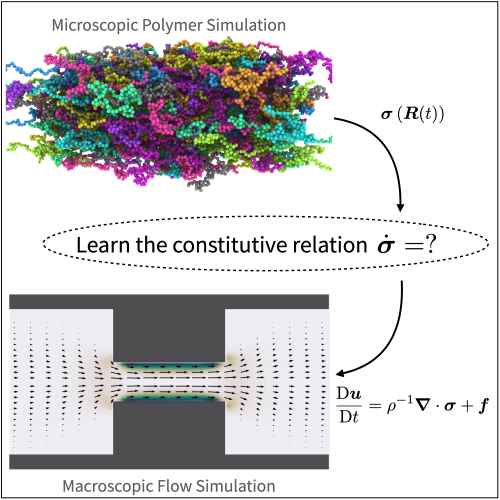2020.08.11
Learning how polymers flow : from microscopic dynamics to macroscopic material properties
- Technologies
- Knowledge acquisitions and sharing
- Kyoto University
- https://journals.aps.org/prresearch/abstract/10.1103/PhysRevResearch.2.033107
We have developed a learning strategy capable of unraveling the relationship between the macroscopic flow properties of polymer materials, and the behavior of the microscopic polymer chains they are composed of. This micro/macro coupling, together with the accompanying memory effects, have made the study of polymers one of the most challenging undertakings of modern material science. Polymers, which are repeating chains of molecules, have been commonly used in various industries such as food, plastics, rubbers, and most modern electronics. Recently, there is a growing demand for producing advanced high-functioning polymer products in a cost-effective way, but there is still much we do not understand about polymer physics or how to optimize the manufacturing of polymeric materials. In particular, no general solution is known that can describe the deformation response, i.e., the stress, of an ensemble of microscopic polymers to a macroscopic flow, in large part due to the complex memory effects related to the history dependence of the polymer conformations. The method we propose provides a direct link between the micro and macro scales from which these memory effects can be learned. Thus, it will allow us to dramatically accelerate current state-of-the-art simulation methods, and to realize more sophisticated polymer molding technologies to create the next generation of polymer products.
[ John J. Molina (Assistant Professor, Department of Chemical Engineering, Graduate School of Engineering, Kyoto University) / Takashi Taniguchi (Associate Professor, Department of Chemical Engineering, Graduate School of Engineering, Kyoto University) ]
( https://journals.aps.org/prresearch/abstract/10.1103/PhysRevResearch.2.033107 )

Technologies
1